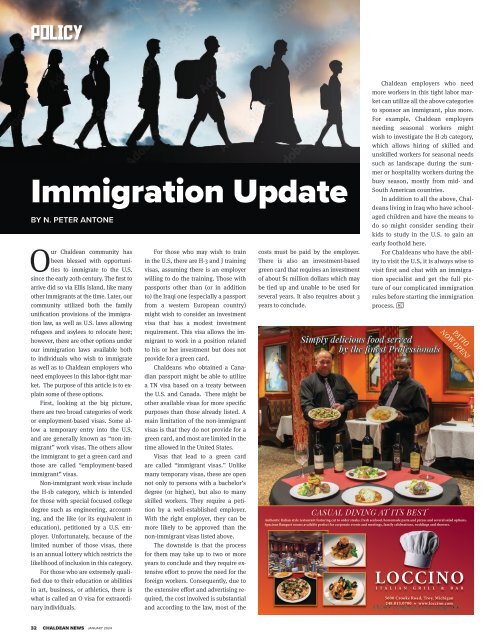You also want an ePaper? Increase the reach of your titles
YUMPU automatically turns print PDFs into web optimized ePapers that Google loves.
POLICY<br />
Immigration Update<br />
BY N. PETER ANTONE<br />
Our Chaldean community has<br />
been blessed with opportunities<br />
to immigrate to the U.S.<br />
since the early 20th century. The first to<br />
arrive did so via Ellis Island, like many<br />
other immigrants at the time. Later, our<br />
community utilized both the family<br />
unification provisions of the immigration<br />
law, as well as U.S. laws allowing<br />
refugees and asylees to relocate here;<br />
however, there are other options under<br />
our immigration laws available both<br />
to individuals who wish to immigrate<br />
as well as to Chaldean employers who<br />
need employees in this labor-tight market.<br />
The purpose of this article is to explain<br />
some of these options.<br />
First, looking at the big picture,<br />
there are two broad categories of work<br />
or employment-based visas. Some allow<br />
a temporary entry into the U.S.<br />
and are generally known as “non-immigrant”<br />
work visas. The others allow<br />
the immigrant to get a green card and<br />
those are called “employment-based<br />
immigrant” visas.<br />
Non-immigrant work visas include<br />
the H-1b category, which is intended<br />
for those with special focused college<br />
degree such as engineering, accounting,<br />
and the like (or its equivalent in<br />
education), petitioned by a U.S. employer.<br />
Unfortunately, because of the<br />
limited number of those visas, there<br />
is an annual lottery which restricts the<br />
likelihood of inclusion in this category.<br />
For those who are extremely qualified<br />
due to their education or abilities<br />
in art, business, or athletics, there is<br />
what is called an O visa for extraordinary<br />
individuals.<br />
For those who may wish to train<br />
in the U.S, there are H-3 and J training<br />
visas, assuming there is an employer<br />
willing to do the training. Those with<br />
passports other than (or in addition<br />
to) the Iraqi one (especially a passport<br />
from a western European country)<br />
might wish to consider an investment<br />
visa that has a modest investment<br />
requirement. This visa allows the immigrant<br />
to work in a position related<br />
to his or her investment but does not<br />
provide for a green card.<br />
Chaldeans who obtained a Canadian<br />
passport might be able to utilize<br />
a TN visa based on a treaty between<br />
the U.S. and Canada. There might be<br />
other available visas for more specific<br />
purposes than those already listed. A<br />
main limitation of the non-immigrant<br />
visas is that they do not provide for a<br />
green card, and most are limited in the<br />
time allowed in the United States.<br />
Visas that lead to a green card<br />
are called “immigrant visas.” Unlike<br />
many temporary visas, these are open<br />
not only to persons with a bachelor’s<br />
degree (or higher), but also to many<br />
skilled workers. They require a petition<br />
by a well-established employer.<br />
With the right employer, they can be<br />
more likely to be approved than the<br />
non-immigrant visas listed above.<br />
The downside is that the process<br />
for them may take up to two or more<br />
years to conclude and they require extensive<br />
effort to prove the need for the<br />
foreign workers. Consequently, due to<br />
the extensive effort and advertising required,<br />
the cost involved is substantial<br />
and according to the law, most of the<br />
costs must be paid by the employer.<br />
There is also an investment-based<br />
green card that requires an investment<br />
of about $1 million dollars which may<br />
be tied up and unable to be used for<br />
several years. It also requires about 3<br />
years to conclude.<br />
Chaldean employers who need<br />
more workers in this tight labor market<br />
can utilize all the above categories<br />
to sponsor an immigrant, plus more.<br />
For example, Chaldean employers<br />
needing seasonal workers might<br />
wish to investigate the H-2b category,<br />
which allows hiring of skilled and<br />
unskilled workers for seasonal needs<br />
such as landscape during the summer<br />
or hospitality workers during the<br />
busy season, mostly from mid- and<br />
South American countries.<br />
In addition to all the above, Chaldeans<br />
living in Iraq who have schoolaged<br />
children and have the means to<br />
do so might consider sending their<br />
kids to study in the U.S. to gain an<br />
early foothold here.<br />
For Chaldeans who have the ability<br />
to visit the U.S, it is always wise to<br />
visit first and chat with an immigration<br />
specialist and get the full picture<br />
of our complicated immigration<br />
rules before starting the immigration<br />
process.<br />
Simply delicious food served<br />
by the finest Professionals<br />
CASUAL DINING AT ITS BEST<br />
PATIO<br />
NOW OPEN!<br />
Authentic Italian style restaurant featuring cut to order steaks, fresh seafood, homemade pasta and pizzas and several salad options.<br />
Spacious Banquet rooms available perfect for corporate events and meetings, family celebrations, weddings and showers.<br />
5600 Crooks Road, Troy, Michigan<br />
248.813.0700 ◆ ◆ www.loccino.com<br />
STORY continued from page XX<br />
32 CHALDEAN NEWS <strong>JANUARY</strong> <strong>2024</strong>
















